Keynote Speakers
Speakers
Plenary 1. Dynamic Perspectives on Creativity in Higher Education (Wednesday 11th)
Plenary 2. In Ref we trust? Some reasons to be cheerful (Wednesday 11th)
Plenary 3. Panel Discussion: Preparing critical students for the post-truth era, Key Research Questions (Thursday 12th)
Chair: Dr Neil Harrison, Deputy Director of the Rees Centre,
Associate Professor at the University of Oxford
Contributors:
Dr Foluke Adebisi, University of Bristol
Dr Ibrar Bhatt, Queen’s University Belfast
Dr Elizabeth Hauke, Imperial College London
Dr Kathy Luckett, University of Cape Town
Closing debate: Creativity, Criticality and Conformity: The Impact of Competition on Research (Friday 13th)
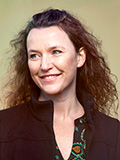
|
Professor Lene Tanggaard
|
Keynote Address |
Post-keynote Address Interview |
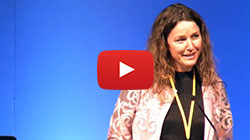 |
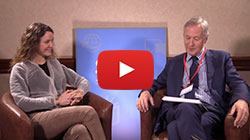 |
Plenary 1: Wednesday 11th December
Dynamic Perspectives on Creativity in Higher Education
In her Keynote, Professor Lene Tanggaard will set the scene for the conference by fuelling discussions on the dilemmas, the challenges and key opportunities in working with creativity in education broadly and in higher education more specifically. Tanggaard will present basic definitions of creativity and related terms such as invention and innovation, together with their possible roles as concepts in a higher educational setting. Our speaker will invite us to adopt more dynamic perspectives on creativity, focusing on the central role of faculty and staff relationships in the development of creativity at an organizational level in departments and in teaching and research units. The difference between teaching creatively versus teaching for creativity will be outlined, and Tanggaard will present her own teaching model for creativity applied in a university setting, meeting a central concern of how to enable students to take part in creative communities as part of their education.
Lene Tanggaard is Professor of Psychology in the Department of Communication and Psychology at the University of Aalborg, Denmark, where she serves as Vice Head of Department, advisor for several Ph.D.-students, Director of The International Centre for the Cultural Psychology of Creativity (ICCPC), and co-director of the Center for Qualitative Studies, a network of more than 90 professors and researchers concerned with methodology and development of new research tools (http://www.cqs.aau.dk/). She is regional editor of The International Journal of Qualitative Research in Education. Publications include: Glaveanu, V. P., Tanggaard, L. & Wegener, C. (2016), Creativity: A new vocabulary Palgrave Macmillan and Tanggaard, L. (2018). Creativity in Higher education: Apprenticeship as a ‘thinking-model’ for bringing back more dynamic, teaching and research in a university context. I J. Valsiner, A. Lutsenko, & A. Antoniouk (red.), Sustainable Futures for Higher Education: The making of knowledge makers (pp. 263-277). Schweitzerland: Springer. Cultural Psychology of Education.
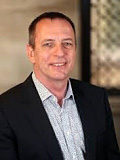 |
|
Keynote Address |
Post-keynote Address Interview |
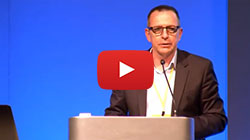 |
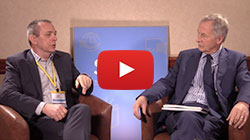 |
Plenary 2. Wednesday 11th December
In Ref we trust? Some reasons to be cheerful
Originally hatched by the Thatcher government, the very crucible of UK neoliberalism (Harvey, 2005), UK research quality assessment continues to be felt by many to be a performative monster. The high-stakes nature of the exercise offers fertile ground for myths and misinformation. Institutions vary in how they communicate and mediate its requirements, ranging from excessive managerialism to dialogic, shared engagement.
For most working in HE, REF is seen through the (sometimes murky) lens of institutional requirements, and this is one reason it gets a ‘bad press’. I would not attempt to persuade anyone that REF is wonderful. However, I do think it has a number of features that are under-appreciated. These include its refinement through consultation, its serious attempts to minimise gaming and unfairness, its professionalism and - most of all - its adherence to robust expert peer review. The latter (which both Conservative and New Labour ideologues would once have derided as ‘producer capture’) gives it a legitimacy that is absent from other quality mechanisms. Having looked at how Education is a distinctive field within the REF, I will consider some key elements of the process and how the Education sub-panel will work. I will also mention the nature of the ‘bargain’ that the REF represents between universities and the state/public.
David James is a Professor in the School of Social Sciences at Cardiff University, and until recently, Director of the ESRC Wales Doctoral Training Partnership. He has a distinguished track record as a social science researcher and teacher, mainly focused on the sociological study of Education. He has directed and co-directed many projects funded by ESRC, government departments, charities, local authorities and others. Topics include: learning and assessment in Further and Higher Education; secondary school choice; education and social inequality; policy and governance in the FE and Skills sector. David is a Fellow of the Academy of Social Sciences and a member of the ESRC Peer Review College. He was a member of BERA Council for six years, chairing one its three committees. He edits a leading international journal, the British Journal of Sociology of Education. At the end of 2017 he was appointed to chair the UK REF 2021 Education sub-panel.
Plenary 3. Panel Discussion: Thursday 12th December
Preparing critical students for the post-truth era, Key Research Questions
Plenary 3 |
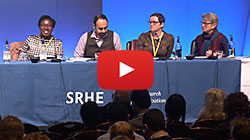 |
| We recommended you refer to the slides provided when watching this video |
| Keynote Panel |
Chair: Dr Neil Harrison, Deputy Director of the Rees Centre, Associate Professor at the University of Oxford
We are now two decades into the internet age. It has opened up unprecedented access to information at minimal time outlay and cost, radically altering patterns of knowledge creation and disrupting long-standing epistemic communities and traditions.
However, the growth of the internet has also ushered in new challenges – or perhaps old challenges in new forms. There are growing battles over whose knowledge is valued and who gets to determine ‘truth’. The production and dissemination of deliberate misinformation is now big business, while the democratising effect of the internet means that many more voices are scrambling to be heard – some emancipatory and some hegemonic. We have entered a post-truth era, where the veracity of information is often less important than its presentation and reach.
This panel discussion will explore what this means for universities, especially with respect to how they might best prepare students with the critical values, skills and dispositions needed for success in the post-truth world. Graduates increasingly need to be able to navigate a world that is flooded with information, but where meaningful knowledge is increasingly complex, contested and hard to come by. The four panel members will approach the question from distinct perspectives that contribute to a wider debate (and research agenda) about what should be taught and how.
Panel Speakers:
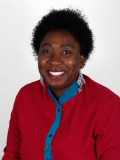 |
Dr Foluke Adebisi |
Decolonisation is impossible: can we disrupt the co-optation of decolonial language within the neoliberal university?
Decolonisation risks becoming a metaphor for ahistorical and performative attempts at social justice, that do the opposite of the aims of decolonisation – i.e. rather than interrupt coloniality, these attempts preserve the university structure and reify Whiteness at the academy. This is because the ontology of the neoliberal university serves to obscure its own complicity in creating and maintaining its own colonial knowledge hierarchies.
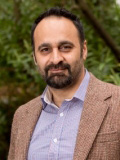 |
Dr Ibrar Bhatt |
The mechanics of trust in online practice
When students come to know or trust that something online is true, it is rational for them to grant credibility to epistemic authorities, and to trust on the basis of reputation, expertise, and so on: epistemic dependence is necessary and unavoidable as we all have limited time and resources. However, digital platforms and technologies offer users both opportunities and the potential to constrain and suppress. How students make use of these opportunities and how they come to make sense of the constraints is a challenge facing educators in a ’post-truth’ world.
 |
Dr Elizabeth Hauke |
Critical tensions: is STEM education stuck in a ‘truth era’?
Approaches to investigating and establishing truth and knowledge vary between disciplines. Academic practice built around the scientific method and a positivist paradigm within science and engineering creates an expectation among students of the existence of a single correct understanding of any concept or phenomenon. What challenges does this pose for the education of students graduating into a post-truth environment and what strategies might help resolve this tension?
 |
Dr Kathy Luckett |
The importance of asserting epistemic relations and the institutional conditions for their protection in a post truth society
Social media platforms tend to encourage a strengthening of social as opposed to epistemic relations of knowledge production. This serves to encourage students to adopt positions of epistemic relativism, especially in the humanities. I will argue we need to find a middle ground that admits to the socio-political effects of control of knowledge production by hegemonic groups, that opens up the field for contributions by those hitherto excluded, but at the same time preserves the practices and conditions that permit the exercise of epistemic judgment and norms.
Closing debate. Creativity, criticality and conformity: the impact of competition on research (Friday 13th)
Closing Debate |
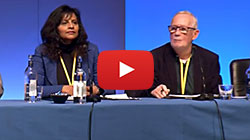 |
Rajani Naidoo and Ian Jamieson take opposing sides on the question of whether competition supports or hinders creativity and its impact on criticality and conformity in research. The session begins with a shared understanding that competition is a social construction, and that a variety of forms of competition exist in higher education with significant consequences for research.
The speakers then deviate sharply from each other with Rajani Naidoo drawing on insights from political economy, sociology and psychoanalysis to illuminate how competition has become a fetish amplified by political, economic and affective mechanisms, and how different forms of competition work together perversely to encourage bland conformity. She focusses in particular on how competition erodes the global knowledge commons and forecloses knowledge reservoirs and pathways of discovery for future generations.
Ian Jamieson combines research insights from education and his experience in a senior leadership position to argue that competition, particularly related to meritocracy, is at the heart of creativity in higher education. He draws on Bourdieu’s concept of scientific capital to show how competition between scholars drives forward innovation in higher education. Deploying his experience as a senior manager, he suggests that competition, adjudicated by peer review, is the fairest system we have for allocating rewards to individuals and institutions, and that market competition, when adequately regulated, provides additional resources for creativity to flourish.
The questions put to the audience at the end of this debate are 1) What are your experiences of the impact of competition on creativity, criticality and conformity? How should we as researchers and research managers, individually and collectively, respond to growing competition in higher education?
.jpg) |
Professor Rajani Naidoo Prosessor in Higher Education Management, Director of the Centre for Higher Education Management (ICHEM), School of Management, University of Bath, UK |
Closing debate. Friday 13th
Creativity, criticality and conformity: the impact of competition
Rajani Naidoo is Professor and Director of the International Centre for Higher Education Management in the School of Management at the University of Bath. She is also Visiting Professor, Critical Studies in Higher Education Transformation at Nelson Mandela University, South Africa. She researches transformations in global political economy and change in higher education with a focus on competition and markets, new forms of imperialism, the changing nature of academic work and the contribution of universities to global wellbeing. She has delivered keynotes in a wide range of countries and presented the 2016 Annual Worldviews lecture in Canada. She has acted as expert advisor to international bodies and has participated in research programmes relating to social justice, the public good and the academic profession. She sits on the research and development steering committee of the European Foundation for Management Development and on editorial boards including the British Journal of Sociology of Education, Philosophy and Theory in Higher Education and the International Journal of Sociology of Education. She co-edits the book series Global Higher Education (Palgrave/Macmillan) and African Higher Education Dynamics (African Minds).
.jpg) |
|
Closing debate. Friday 13th
Creativity, criticality and conformity: the impact of competition
Ian Jamieson is a Director in Chambers and Jamieson Associates Educational Consultancy and Fellow of the Academy of Social Sciences. He has served as interim Deputy Chief Executive for the Higher Education Academy, as an auditor of the UK Quality Assurance Agency and is also an overseas auditor for South Africa and Hong Kong. In addition, he has acted as non-executive director of UCAS, the UK university admissions agency, and sat on the UK Funding Council's main committee on teaching, quality and the student experience. Previously he was Professor of Education and Pro Vice Chancellor at the University of Bath. He has published over 90 papers and five books, mostly about various aspects of education. He was the founder and first editor of the Journal of Education and Work. His research interests include leadership, quality assurance, the relationship between education and work, pedagogy, innovation and leadership. In 2009 he was awarded an OBE in the Queen's New Year Honours for services to local and national higher education.

the global higher education research community…






